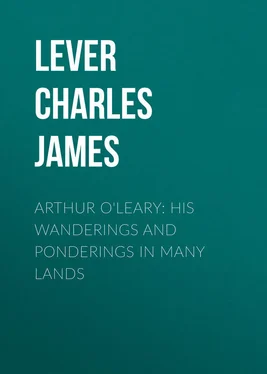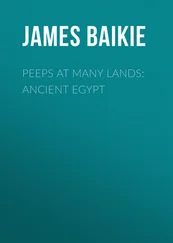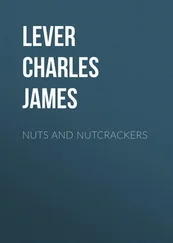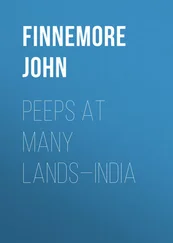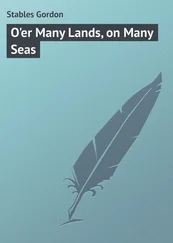Charles Lever - Arthur O'Leary - His Wanderings And Ponderings In Many Lands
Здесь есть возможность читать онлайн «Charles Lever - Arthur O'Leary - His Wanderings And Ponderings In Many Lands» — ознакомительный отрывок электронной книги совершенно бесплатно, а после прочтения отрывка купить полную версию. В некоторых случаях можно слушать аудио, скачать через торрент в формате fb2 и присутствует краткое содержание. Издательство: Иностранный паблик, Жанр: literature_19, foreign_antique, foreign_prose, на английском языке. Описание произведения, (предисловие) а так же отзывы посетителей доступны на портале библиотеки ЛибКат.
- Название:Arthur O'Leary: His Wanderings And Ponderings In Many Lands
- Автор:
- Издательство:Иностранный паблик
- Жанр:
- Год:неизвестен
- ISBN:нет данных
- Рейтинг книги:3 / 5. Голосов: 1
-
Избранное:Добавить в избранное
- Отзывы:
-
Ваша оценка:
- 60
- 1
- 2
- 3
- 4
- 5
Arthur O'Leary: His Wanderings And Ponderings In Many Lands: краткое содержание, описание и аннотация
Предлагаем к чтению аннотацию, описание, краткое содержание или предисловие (зависит от того, что написал сам автор книги «Arthur O'Leary: His Wanderings And Ponderings In Many Lands»). Если вы не нашли необходимую информацию о книге — напишите в комментариях, мы постараемся отыскать её.
Arthur O'Leary: His Wanderings And Ponderings In Many Lands — читать онлайн ознакомительный отрывок
Ниже представлен текст книги, разбитый по страницам. Система сохранения места последней прочитанной страницы, позволяет с удобством читать онлайн бесплатно книгу «Arthur O'Leary: His Wanderings And Ponderings In Many Lands», без необходимости каждый раз заново искать на чём Вы остановились. Поставьте закладку, и сможете в любой момент перейти на страницу, на которой закончили чтение.
Интервал:
Закладка:
***** *****
The same effect which the announcement of dinner produces on the stiff party in the drawing-room, is caused by the information of being alongside the quay, to the passengers of a packet. It is true the procession is not so formal in the latter as in the former case: the turbaned dowagers that take the lead in one, would, more than probably, be last in the other: but what is lost in decorum, is more than made up in hilarity. What hunting for carpet-bags! what opening and shutting of lockers! what researches into portmanteaus, to extricate certain seizable commodities, and stow them away upon the person of the owner, till at last he becomes an impersonation of smuggling, with lace in his boots, silk stockings in his hat, brandy under his waistcoat, and jewelry in the folds of his cravat. There is not an item in the tariff that might not be demonstrated in his anatomy: from his shoes to his night-cap, he is a living sarcasm upon the revenue. And, after all, what is the searching scrutiny of your Quarterly Reviewer, to the all-penetrating eye of an excise officer? He seems to look into the whole contents, of your wardrobe before you have unlocked the trunk “warranted solid leather,” and with a glance appears to distinguish the true man from the knave, knowing, as if by intuition, the precise number of cambric handkerchiefs that befits your condition in life, and whether you have transgressed the bounds of your station, by a single bottle.
What admirable training for a novelist would a year or two spent in such duties afford; what singular views of life; what strange people must he see; how much of narrative would even the narrow limits of a hat-box present to him; and how naturally would a story spring from the rosy-cheeked old gentleman, paying his duty upon a “ pâté de fois-gras ” to his pretty daughter, endeavouring, by a smile, to diminish the tariff on her French bonnet, and actually captivate a custom-house officer by the charms of her “ robe a la Victorine .”
The French “ douaniers ,” are droll fellows, and are the only ones I have ever met who descend from the important gravity of their profession, and venture upon a joke. I shall never forget entering Valenciennes late one night, with a large “Diligence” party, among which was a corpulent countryman of my own, making his first continental tour. It was in those days when a passport presented a written portrait of the bearer; when the shape of your nose, the colour of your hair, the cut of your beard, and the angle of incidence of your eyebrow, were all noted down and commented on, and a general summing up of the expression of your features, collectively, appended to the whole; and you went forth to the-world with an air “mild,” or “military;” “feeble,” “fascinating,” or “ferocious,” exactly as the foreign office deemed it. It was in those days, I say, when, on entering the fortress of Valenciennes, the door of the “Diligence” was rudely thrown open, and, by the dim nicker of a lamp, we beheld a moustached, stern-looking fellow, who rudely demanded our passports. My fat companion, suddenly awakened from his sleep, searched his various pockets with all the trepidation of a new traveller, and at length, produced his credentials, which he handed, with a polite bow, to the official. Whatever the nature of the description I cannot say, but it certainly produced the most striking effect on the passport officers, who laughed loud and long as they read it over.
“ Descendez, Monsieur ” said the chief of the party, in a tone of stern command.
“What does he say?” said the traveller, in a very decided western accent.
“You must get out, sir” said he.
“Tare-an-ages,” said Mr. Moriarty, “what’s wrong?”
After considerable squeezing, for he weighed about twenty stone, he disengaged himself from the body of the “Diligence,” and stood erect upon the ground. A second lantern was now produced, and while one of the officers stood on either side of him, with a light beside his face, a third read out the clauses of the passport, and compared the description with the original. Happily, Mr. Moriarty’s ignorance of French saved him from the penalty of listening to the comments which were passed upon his “ nez retroussé ” “ bouche ouverte ” &c.; but what was his surprise when, producing some yards of tape, they proceeded to measure him round the body, comparing the number of inches his circumference made, with the passport.
“ Quatre-vingt-dix pouces ,” said the measurer, looking at the document, “ Il en a plus ,” added he, rudely.
“What is he saying, sir, if I might be so bowld?” said Mr. Moriarty to me, imploringly.
“You measure more than is set down in your passport,” said I, endeavouring to suppress my laughter.
“Oh, murther! that dish of boiled beef and beet-root will be the ruin of me. Tell them, sir, I was like a greyhound before supper.”
As he said this, he held in his breath, and endeavoured, with all his might, to diminish his size; while the Frenchmen, as if anxious to strain a point in his favour, tightened the cord round him, till he almost became black in the face.
“ C’est ça ” said one of the officers, smiling blandly as he took off his hat; “ Monsieur peut continuer sa route .”
“All right,” said I, “you may come in, Mr. Moriarty.”
“‘Tis civil people I always heard they wor,” said he; “but it’s a sthrange country where it’s against the laws to grow fatter.”
I like Holland; – it is the antipodes of France. No one is ever in a hurry here. Life moves on in a slow majestic stream, a little muddy and stagnant, perhaps, like one of their own canals, but you see no waves, no breakers – not an eddy, nor even a froth-bubble breaks the surface. Even a Dutch child, as he steals along to school, smoking his short pipe, has a mock air of thought about him. The great fat horses, that wag along, trailing behind them some petty, insignificant truck, loaded with a little cask, not bigger than a life-guardsman’s helmet, look as though Erasmus was performing duty as a quadruped, and walking about his own native city in harness. It must be a glorious country to be born in. No one is ever in a passion; and as to honesty, who has energy enough to turn robber? The eloquence, which in other lands might wind a man from his allegiance, would be tried in vain here. Ten minutes’ talking would set any audience asleep, from Zetland to Antwerp. Smoking, beer-drinking, stupifying, and domino-playing, go on, in summer, before, in winter, within, the cafés , and every broad flat face that you look upon, with its watery eyes and muddy complexion, seems like a coloured chart of the country that gave it birth.
How all the industry, that has enriched them, is ever performed – how all the cleanliness, for which their houses are conspicuous, is ever effected, no one can tell. Who ever saw a Dutchman labour? Every thing in Holland seems typified by one of their own drawbridges, which rises as a boat approaches, by invisible agency, and then remains patiently aloft, till a sufficiency of passengers arrives to restore it to its place, and Dutch gravity seems the grand centre of all prosperity.
When, therefore, my fellow-passengers stormed and swore because they were not permitted to land their luggage; when they heard that until nine o’clock the following morning, no one would be astir to examine it; and that the Rhine steamer sailed at eight, and would not sail again for three days more, and cursed the louder thereat; I chuckled to myself that I was going no where, that I cared not how long I waited, nor where, and began to believe that something of very exalted philosophy must have been infused into my nature without my ever being aware of it.
Читать дальшеИнтервал:
Закладка:
Похожие книги на «Arthur O'Leary: His Wanderings And Ponderings In Many Lands»
Представляем Вашему вниманию похожие книги на «Arthur O'Leary: His Wanderings And Ponderings In Many Lands» списком для выбора. Мы отобрали схожую по названию и смыслу литературу в надежде предоставить читателям больше вариантов отыскать новые, интересные, ещё непрочитанные произведения.
Обсуждение, отзывы о книге «Arthur O'Leary: His Wanderings And Ponderings In Many Lands» и просто собственные мнения читателей. Оставьте ваши комментарии, напишите, что Вы думаете о произведении, его смысле или главных героях. Укажите что конкретно понравилось, а что нет, и почему Вы так считаете.
